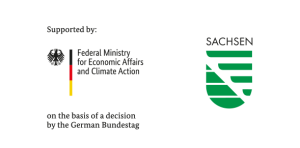The new b-ACTmatter project ‘LivMat: Productive catalytic living materials: combining 3D biobased fibrillar membranes with synthetic microbial consortia to produce chemicals’ was launched this summer.
On 19 September 2024 the project partners from Leipzig University, Helmholtz Centre for Environmental Research (UFZ), Istanbul Technical University (ITU), Kaunas University of Technology (KUT), University of Latvia (ULaT) and Solaga GmbH met in Leipzig’s BIO CITY for the kick-off meeting.
At the kick-off meeting, the project partners presented their respective expertise and methods and concretised the next steps and tasks in the project process. The scientists discussed how methods, materials and the conditions of the used technologies and current models can be improved and what potential role AI could play in the optimisation processes..
The next meeting of the project partners is planned for next year in Istanbul.
Rationale and Objectives of the Livmat project
Global chemical systems are primarily fossil-dependent, which means limited and emission-intensive. Sustainable solutions for the production of chemicals for a circular (bio)economy are therefore imperative.
The main objective of the LivMat project is to capture and utilize natural resources (such as natural fibers) and waste resources (e.g. CO2) to develop catalytic living materials (cat-LMs) that are robust, energy efficient and scalable for chemical production. The project aims to develop a synthetic microbial consortium that utilises natural and waste resources. In addition, the construction of prototype bioreactors based on cat-LMs for continuous monomer production is planned. The process helps to bind CO2 and support the EU’s targets for reducing greenhouse gas emissions. With the development of bioreactor prototypes for continuous chemical production, the project supports the European Green Deal and the Circular Economy Action Plan.
Funding network M-ERA.NET
The project is funded by M-ERA.NET (‘Material and Energy Research Alliance – European Network’). The consortium is a European network of public funding organisations that supports and improves the coordination of national and regional funding programmes in the field of materials and battery technologies. It funds projects with innovative technologies that pursue and promote the United Nations Sustainable Development Goals (SDGs).
